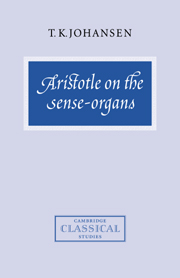5 - Smell
Published online by Cambridge University Press: 22 September 2009
Summary
The difficulty in defining odour
The last of the five senses to be considered in this work is smell. Aristotle examines smell in De Anima 11.9. When we begin reading 11.9 we expect Aristotle to start his account of smell by telling us what its proper object is. We expect that he will define the ‘smellable’ and then define smell as the potentiality to be like the smellable, just as he in 11.7 defined what vision was by first defining the visible. The expectation is eventually confirmed at De Anima 11.9 421b3–6 where Aristotle says that smell is of the smellable and unsmellable just as hearing is of the audible and inaudible and sight is of the visible and invisible. The claim links 11.9 back to 11.7–8 by emphasising that smell is to be explained in the same way as hearing and sight, namely, with reference to its proper object.
But before this he has argued that the smellable, that is odour, is difficult to define because we as human beings have an unclear sense of smell:
It is less easy to give a definition concerning the sense of smell and what can be smelt than concerning those we have talked about. For it is not clear what sort of quality odour is, in the way that it was clear what sort of quality sound or colour was. The reason is that our sense of smell is not accurate but worse than many animals, for man smells poorly.
(421a7–11).- Type
- Chapter
- Information
- Aristotle on the Sense-Organs , pp. 226 - 251Publisher: Cambridge University PressPrint publication year: 1997

